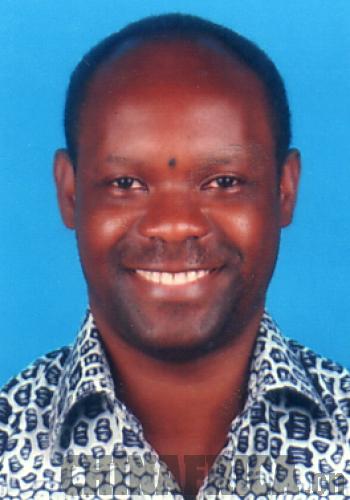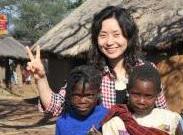|
All eyes this month will be trained on London, where the 2012 Olympic Games are about to begin. Sports have long been seen as an effective way to connect people from different countries and cultures. Four Africans and Chinese spectators share their opinions on athletics with ChinAfrica.

Luc Bendza, Kungfu actor from Gabon
When you begin to learn about a country, it always starts with sports. Sports easily connect people. They can ease conflicts over politics, economy or cultures, as was the case with ping-pong diplomacy between China and the United States last century.
Since the early 1990s, China's General Administration of Sport has sent Chinese coaches to Africa, mainly to instruct in basketball or baseball. It was only later, when China began to bid for the Olympic Games, that Chinese traditional sports entered the spotlight. Since then, many athletes and teachers have traveled to Africa on training exchanges. China and African countries like Gabon, Malawi and Namibia have agreed to make sports communication a regular yearly event. Many African teams have or have had Chinese coaches. And among all sports, wushu – martial arts – is one of the most popular.
In every African country everyone knows Bruce Lee. He triggers an interest in Chinese culture, and so wushu contributes a lot to promoting relations between China and other countries. You cannot find an equivalent figure or function in Western sports. Wushu, as I know, has helped Gabon learn about China, and China about Gabon.
China's government and embassies have been making great efforts to promote wushu in Africa. But I think it's far from enough. We can and should do more. Wushu promotion should not be completely reliant on government initiatives. Chinese enterprises in Africa should also join the team, as it were. This will benefit both enterprises and local martial arts associations.
Japan and South Korea have been doing a good job pushing aikido and karate in Africa. While promoting their own cultures through sports, they take the opportunity to learn about local people and their real needs. This will help them assist African countries in a better way, which will greatly promote relations between countries.

Zhang Yuping, Deputy Secretary General of the Chinese Wushu Association
Wushu plays a unique role in promoting international communication. It is a candidate for entry at the 2020 Olympic Games, and we hope we can help finally make martial arts a member of the Olympic family through our efforts. The International Wushu Federation now has members from 145 countries and regions, covering five continents.
In 2010, a Chinese wushu performance team visited South Africa, Angola and Seychelles. A year later, they gave another six performances, this time in Madagascar, Namibia, Gabon and Mozambique. The excellent performances were a sensation, causing a wave of wushu fever. Whenever performers made their curtain call, the stadiums were filled with thunderous applause. While the performers impressed spectators with their prowess, they also found themselves moved by the enthusiasm of their audiences. Some children took the opportunity to show off kungfu of their own, maybe sparking a wushu dream for many African youngsters.

Jonathan Etienne Fourie, A South African teacher at the Minzu University of China
When I first arrived in China eight years ago, the first question people asked me was "Where are you from?" I soon learned not to say "South Africa," because nobody knew where it was. Depending on the mood I was in, I told many Chinese that I was from Canada, America or England. No problem, they understood and knew where those places were. But nowadays, when I answer South Africa, everybody, from taxi drivers to students and every stranger I meet, almost without exception, knows where it is. Some even make kicking motions in recognition.
The reason? Between 2004 and now, there was a soccer World Cup – held in South Africa in 2010. In sports-mad China this was big news. And this kind of "soft power" was a contributing factor to South Africa joining the BRIC nations, making it closer to China. In fact, my view is that the soccer World Cup made millions of people more aware of the vast African continent with its diverse cultures and histories.
The opposite, of course, is also true: years ago most Africans believed that all Chinese women walked around in traditional Chinese dresses and that all men wore Mao-style suits. But after the 2008 Beijing Olympics came a new view of China in Africa. While most of Africa looked West toward America before 2008, heads are now slowly turning East toward the emerging world power, China.
We now know that not all Chinese just play ping pong, but that they are also world class swimmers, gymnasts and athletes. And also, sadly, that soccer is in its infancy in China. For soccer-mad Africa, this is difficult to understand.

Wang Weiguang, Director of the Sports Dept. at Beijing Language & Culture University
When foreign students come to China, they may get lost in culture gaps. But sports are borderless. There is no difference in sports between countries or cultures. Rules of the game are the same everywhere. Compared to other forms of communication, sports may actually be more effective. There are both foreign students and Chinese students on our campus. Sports are a good platform for our students from other countries to learn about local people and Chinese society.
When foreign students come to China, they learn Chinese language first, followed by Chinese culture. Sport is an indispensable part of the culture. Through learning about traditional Chinese sports like wushu and taiji, they can learn much about China – things they cannot get from language study alone. For example, when teachers teach wushu, they also explain the virtues behind martial arts. |